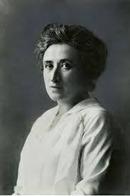
Rosa Luxemburg (1870-1919) Revolutionary and theorist of German socialism, of Polish Jewish origin. The daughter of a Warsaw merchant, her brilliant intelligence enabled her to study despite the prejudices of the time and the discrimination that the Tsarist authorities imposed against Jews in Poland. Her socialist militancy forced her into exile from the age of 18, taking refuge in Switzerland, where she finished her law studies, made contact with exiled revolutionaries and joined the leadership of the young Polish Social Democratic Party. In 1898 she moved to Germany to join the powerful Social Democratic Party of that country (SPD) and participate in the theoretical debates that have stirred her since the deaths of Marx and Engels. Associated with Kautsky, she defended Marxist "orthodoxy" against Bernstein's "revisionism" and made original theoretical contributions about imperialism and the collapse of capitalism, which she believed to be inevitable (The Accumulation of Capital, 1913). Together with Karl Liebknecht she led the protests of the left-wing socialists against the First World War and against the resignation of the SPD to pacifist internationalism; she was arrested for it in 1915, but continued to write from prison. It was she who laid the theoretical foundations for the split of the League of Spartacists (1918), transformed a year later into the German Communist Party (KPD). Together with Liebknecht, she launched the Spartac Revolution of 1919; and, like her, she was killed by the military in charge of her repression.





